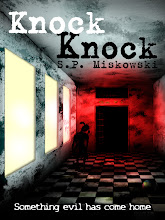 I don’t read tons of crime fiction – I'm a dabbler. But Steve Mosby's name has been floating around the part of my mind devoted to the ever-present ‘what book to read next?’ question for some time, partly because of his excellent short stories in both Off The Record 1 & 2, and partly from seeing a recommendation for his book Black Flowers from Ramsey Campbell.
I don’t read tons of crime fiction – I'm a dabbler. But Steve Mosby's name has been floating around the part of my mind devoted to the ever-present ‘what book to read next?’ question for some time, partly because of his excellent short stories in both Off The Record 1 & 2, and partly from seeing a recommendation for his book Black Flowers from Ramsey Campbell.
So I was expecting this one to be a bit tasty. I wasn't wrong.
Black Flowers tells the story (and I use that word deliberately) of Neil Dawson, a young writer looking into the apparent suicide of his father, who was also a writer. His investigations dig up not just real life clues, but links to his father’s writing and that of another writer, who wrote a book called The Black Flower. Extracts from that book feature as a story within a story in Black Flowers.
Things get even stranger when a story that Neil wrote himself, expressing some of his temporary unease at the idea of becoming a father, seems to start to come true. And it wasn't a pleasant story; not at all.
His partner is kidnapped, and the only way to save her appears to be to understand events buried in the past, and in the pages of The Black Flower. Side by side with this, the book also tells of Hannah Price, a police detective also finding out disturbing things about her own father and the stories he may have told her…
Black Flowers is obsessed with the way stories and narrative shape our lives – and not just stories in books, but those told to us by those we trust. The book presents two opposing, but equally disturbing ideas. Firstly that the stories we have based our beliefs and principles around might actually be false, and that one day we might find our world crumbling as we face up to that. But secondly, that stories have power over our lives regardless of whether they are true or false; that as well as fearing stories turning out to be false we should also fear stories that might start to become all too true.
Lots of books that use meta-fictional trickery do so in a playful way, but Black Flowers plays it straight off the bat and is as dark as hell. It’s this, over and above the horrifying specifics of the crimes featured in the story, that for me makes this book as much horror as a crime novel. I've blogged before about how I don't view horror as a genre as such, but as an ingredient that features in many books that aren't marketed as such. Mosby certainly seems to prove my point here, although the crime genre elements are equally strong and gripping.
The prose is tight, the setting vivid, the characters realistic (even the doubly-fictional ones in the book within a book). Most memorable for me is the imagery of the black flowers themselves, and what the reader comes to understand they represent...
So all in all, very strongly recommended. Dark, clever, and compelling. As I said, I knew it would be a bit tasty.

